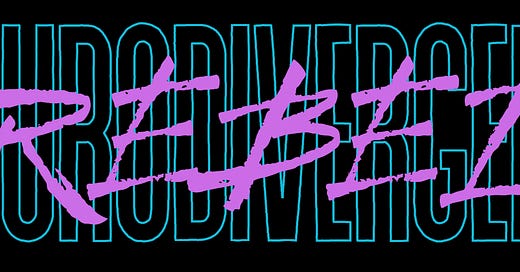Autistic Burnout Saved My Life & Is HOW I learned that I'm Autistic
Many Autistic People have co-occurring health conditions, in addition to Autism. I am no exception. When I became burned out, these conditions flared, leading to my diagnosis at the age of 29.
CW: Suicidal ideation, depression, and mental health crisis
First, what IS Autistic Burnout?
The National Autistic Society defines Autistic burnout as: a syndrome conceptualised as resulting from chronic life stress and a mismatch of expectations and abilities without adequate supports. It is characterised by pervasive, long-term (typically 3+ months) exhaustion, loss of function, and reduced tolerance to stimulus.
These burnouts tend to be caused by stressors in an Autistic person’s environment, and often include sensory distress and other sensory related triggers.
As I began to enter burnout in my late 20’s, my energy was the first thing to go as I felt myself slipping, once again, into survival mode.
Next would be my passions, hobbies, and joys, before falling into a depressive state of hopelessness, when it began to feel like there was no way to escape the spiral I’d fallen into.
Death was beginning to sound like the most logical answer, and I had a plan and a location (a chosen bridge) to end it.
Every day on the way home from work I would fantasize about driving my car off the 45 flyover in Round Rock, Texas, and crashing MANY feet down to the 35 below.
The 45 isn’t a normal flyover, its a MASSIVE bridge that shoots higher into the sky than any bridge I’ve ever seen, towering far above all the buildings in the area.
It was a sure bet, zero survival rate. I know because people have driven off and jumped off of it before, and didn’t live when they did, so it definitely would have worked.
Eventually I became afraid of how good the fantasy began to sound, and started driving a longer route home from work, to avoid looking at “my bridge”.
The bridge wasn’t “off the table”… but I didn’t want to go off on a whim, and the “do it” “do it” “do it” I felt when I took that curve was feeling so good it scared me.
Up until that point I’d been working overtime to camouflage any of my “undesirable traits” at work (which I found out in my diagnostic appointment were all actually my NeuroDivergent traits).
I thought I’d been doing well, but things like “not being social enough with my coworkers” “having typos” and “inappropriate postures” “unfriendly body-language” and being “too fidgety in front of clients”kept coming up on my performance reviews and in passing.
As I grew more burned out, the harder it got for me to camouflage my differences. My mask kept slipping, getting me into more and more trouble at work.
At every other workplace I’d always been a star employee, and being on the “shit list” ate at me, because I wanted so desperately to be the “model employee” that I had been in every other workplace.
The experience haunted me, cursing my sense of self worth, and bringing up old wounds from childhood school traumas that are too common amongst undiscovered NeuroDivergent children.
In school (and now as an adult in a hostile workplace) I wanted desperately to “be good” but did not have the ability to reach the bars that had been set by my peers.
As a kid this meant always displaying a “red tag” for bad behavior, being sent to the hall way for disruptions, calls home when I struggled with compliance, and the frequent removal of recess privileges (for being unable to “sit still” and “listen properly” in class).
Instead of support (more time to move and get my extra energy out), I was further hindered by restrictions and retaliatory punishments for being unable to preform exactly as those around me did.
The school decided that their teaching methods and lack of support weren’t the problem and that I (a child) was the problem.
Discounted, counted out, blamed, punished, scolded, labeled all kinds of horrific names by both authority figures and peers.
My workplace also had decided that I was a problem, and that I needed to conform myself to their systems.
Too frequently NeuroDivergent People are held to NeuroTypical expectations, and punished or blamed for falling short of bars that were unfair the first place.
I felt helpless as I witnessed the pattern of blame and abuse that I’d experienced at the hands of educators repeating in my workplace.
I knew what was expected of me, and I was doing my best, but every time I tried to ask for help or throw in the towel, I was told I “wasn’t trying hard enough” “wasn’t meeting expectations” and “needed to do more” - so I kept pushing, and pushing myself, until I was physically and mentally ill.
People were used me at my best, pre-burnout, and expected me to be the same person I was before. It didn’t matter that I had become too exhausted by life to keep up the facade, because everyone (including me) assumed we all were playing with the same deck.
My house of cards couldn’t stack up, and I felt helpless watching as it all came crumbling down.
Keep reading with a 7-day free trial
Subscribe to NeuroDivergent Rebel’s Substack to keep reading this post and get 7 days of free access to the full post archives.



